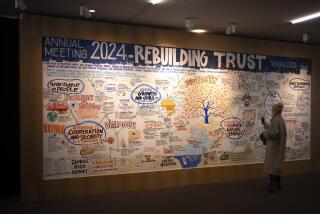Venice Show and Tell
- Share via
Little of substance is likely to emerge from this week’s economic summit meeting in Venice. Despite a stunning array of economic problems around the world, the meeting seems certain to be less a workshop and more a 19th-Century salon, with leaders gathering to see and be seen--and be photographed reassuring one another that things will somehow be better when those who are still in office meet again next year.
The notion that gave rise to the first summit in 1975, and to all since then, is that the world’s leading industrial nations have so much in common that they can achieve more for themselves and other nations if they act in concert. As described in more detail by writers elsewhere in these pages today, what they have in common globally is now overshadowed by very fundamental differences in their domestic situations.
The Third World--its debt and its inability to rise far enough above subsistence levels to buy more goods from the overstocked industrial nations--is clearly a concern on which the United States, the United Kingdom, Canada, Japan, Italy and West Germany should act in concert. But if President Reagan hopes to steal a headline or two away from the Iran- contra hearings he will be more interested in emphasizing progress on arms control and showing leadership in keeping the Persian Gulf safe for oil tankers.
The idea of summit meetings remains valid, even if they are not working as they should. The idea that world leaders can better act in concert if they get together regularly and speak politely but bluntly about areas in which they are hurting rather than helping one another makes as much sense as it did in 1975. It is the leaders themselves who have let summitry go stale, and only they can restore a sense of purpose to summits.
That will require, at a minimum, more frequent meetings between summits of economic specialists from each nation--meetings with the focus more on bluntness than politeness, and on the world as it is rather than the world as domestic politics only makes it seem to be.
More to Read
Sign up for Essential California
The most important California stories and recommendations in your inbox every morning.
You may occasionally receive promotional content from the Los Angeles Times.













